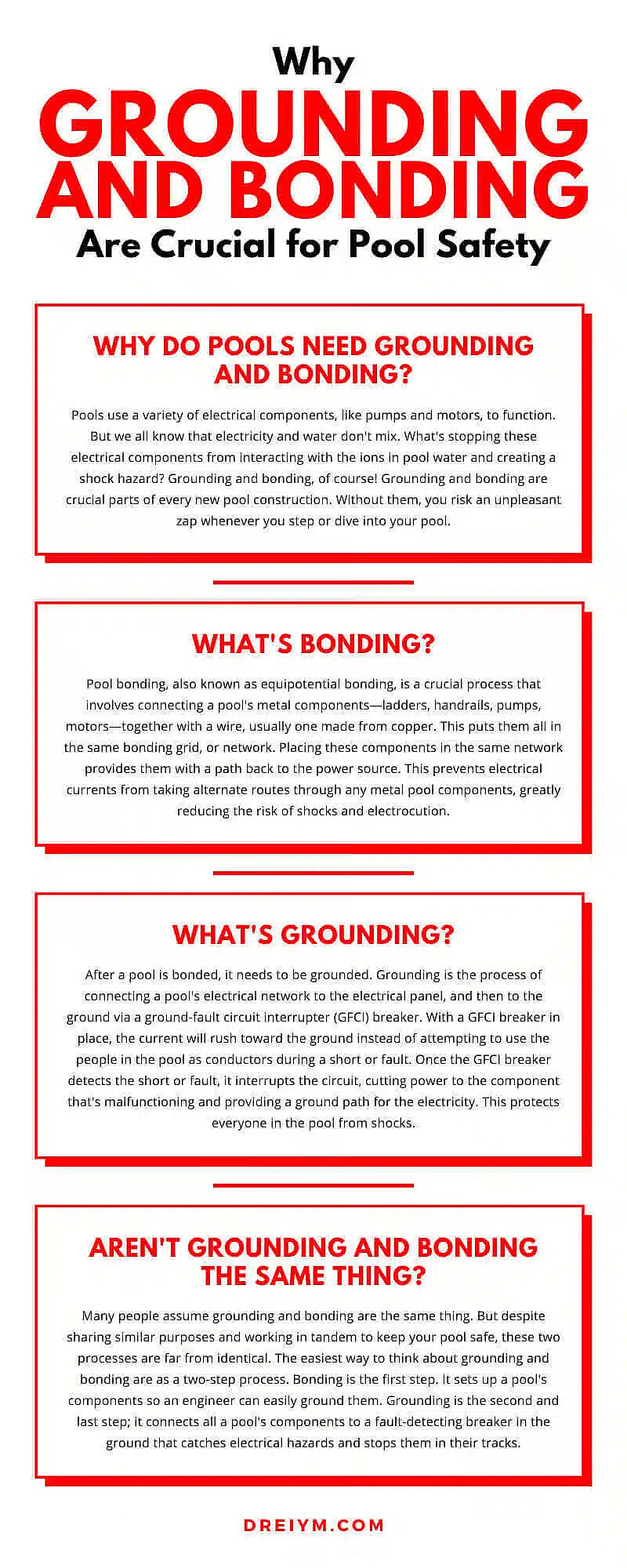Why Grounding and Bonding Are Crucial for Pool Safety
If you’re thinking about adding a brand-new pool to your yard, there’s a lot you need to consider before starting the project. What kind of pool do you want? How big do you want your pool to be? Where do you want to build your pool? One consideration many people ignore is, “What should I do about the grounding and bonding?” Grounding and bonding are two crucial aspects of pool building. Both of them ensure that your pool is free from electrical hazards so you can swim freely without fear of nasty shocks or electrocution. If you want your pool to be a safe place in which to splash around, these are two processes you don’t want to ignore.
But what are grounding and bonding, exactly? What do they do? What makes them so important? If you want to learn more, you’re in the right place. In this overview, Dreiym Engineering will explain the basics behind these two processes and precisely why grounding and bonding are so crucial for pool safety. Read on for everything you need to know so you can ensure your new swimming pool is built to the proper standard. Let’s dive in!
Why Do Pools Need Grounding and Bonding?
Pools use a variety of electrical components, like pumps and motors, to function. But we all know that electricity and water don’t mix. What’s stopping these electrical components from interacting with the ions in pool water and creating a shock hazard? Grounding and bonding, of course! Grounding and bonding are crucial parts of every new pool construction. Without them, you risk an unpleasant zap whenever you step or dive into your pool.
Usually, electrical currents, which have a negative charge, flow from a charged wire (also known as a positive or hot wire) to a neutral one. This balances out their charge. But if one of the wires connected to your pool equipment is broken or frayed, an electrical current may decide to stray from its path and seek a path of lesser resistance toward a positive charge. When this happens, electricity can flow toward various components in your pool, like the handrails or a slide. Wooden and metal components are especially susceptible because both tend to have a positive charge. If someone is touching these components when the current reaches them, they’ll receive an unexpected shock. Bonding and grounding prevent this from happening by providing currents with a low-resistance path that leads directly into the ground, where electricity can discharge safely.
So, for the sake of you, your family, your guests, your pets, and whoever else might be interested in swimming in your pool, it’s critical to hire an experienced electrical engineer or electrician to ground and bond your pool. A lack of grounding and bonding can lead to shocks, electrocution, and even death, so this is a step you don’t want to accidentally let slip.
Now that you understand why grounding and bonding are crucial to pool safety, let’s take a look at what these two processes entail.
What’s Bonding?
Pool bonding, also known as equipotential bonding, is a crucial process that involves connecting a pool’s metal components—ladders, handrails, pumps, motors—together with a wire, usually one made from copper. This puts them all in the same bonding grid, or network. Placing these components in the same network provides them with a path back to the power source. This prevents electrical currents from taking alternate routes through any metal pool components, greatly reducing the risk of shocks and electrocution.
What’s Grounding?
After a pool is bonded, it needs to be grounded. Grounding is the process of connecting a pool’s electrical network to the electrical panel, and then to the ground via a ground-fault circuit interrupter (GFCI) breaker. With a GFCI breaker in place, the current will rush toward the ground instead of attempting to use the people in the pool as conductors during a short or fault. Once the GFCI breaker detects the short or fault, it interrupts the circuit, cutting power to the component that’s malfunctioning and providing a ground path for the electricity. This protects everyone in the pool from shocks.
Aren’t Grounding and Bonding the Same Thing?
Many people assume grounding and bonding are the same thing. But despite sharing similar purposes and working in tandem to keep your pool safe, these two processes are far from identical.
The easiest way to think about grounding and bonding are as a two-step process. Bonding is the first step. It sets up a pool’s components so an engineer can easily ground them. Grounding is the second and last step; it connects all a pool’s components to a fault-detecting breaker in the ground that catches electrical hazards and stops them in their tracks.
Your pool needs bonding and grounding if you want it to be safe. If you miss one or the other, the process is incomplete, and your pool remains an electrocution hazard.
Not Sure if Your Pool Is Safe?
If you want to ensure your existing pool is safe or see if an in-progress pool is properly grounded and bonded before you continue any construction, you’ll need to hire an electrical engineer or electrician to perform a thorough pool inspection. Looking for residential electrical engineers in your area? Dreiym Engineering is a company that serves Texas, Louisiana, Oklahoma, New Mexico, Colorado, and North Dakota. Our experienced engineers can check your pool for proper bonding and grounding. While it’s easiest to perform inspections on in-progress pools, we have remote detection tools that allow us to detect proper grounding in both finished and unfinished pools.
Don’t live in fear of your pool. If you’re worried about safety, an in-depth pool inspection can ease your fears and ensure your poolside experience remains safe and enjoyable. Contact us today to learn more about our residential pool inspection services and to schedule a consultation. We work fast and finalize our reports quickly post-inspection, so you can get back to having fun with family and friends as soon as possible.













































